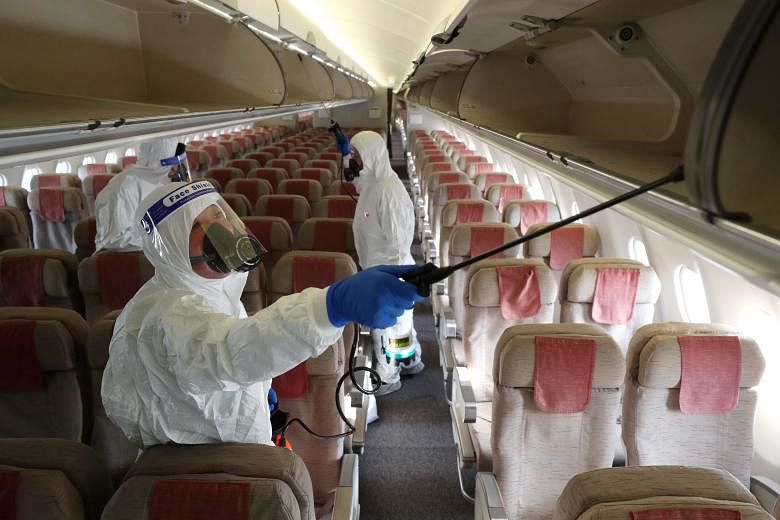
MONTREAL (BLOOMBERG) - Aircraft passengers are twice or even three times more likely to catch Covid-19 during a flight since the emergence of the Omicron variant, according to the top medical adviser to the world's airlines.
The new strain is highly transmissible and has become dominant in a matter of weeks, accounting for more than 70 per cent of all new cases in the US alone.
While hospital-grade air filters on modern passenger jets make the risk of infection much lower on planes than in crowded places on the ground such as shopping malls, Omicron is rapidly spreading just as more travellers take to the skies for year-end holidays and family reunions.
Business class may be safer than more densely packed economy cabins, said Dr David Powell, physician and medical adviser to the International Air Transport Association, which represents almost 300 carriers worldwide.
As before, passengers should avoid face-to-face contact and surfaces that are frequently touched, and people sitting near to each other should try not to be unmasked at the same time during meals, he said.
"The relative risk has probably increased, just as the relative risk of going to the supermarket or catching a bus has increased," said Dr Powell, former chief medical officer at Air New Zealand, who spoke to Bloomberg News on Tuesday (Dec 21) about flying during the pandemic.
What are the risks of infection during a flight?
Whatever the risk was with Delta, we would have to assume the risk would be two to three times greater with Omicron, just as we've seen in other environments. Whatever that low risk - we don't know what it is - on the airplane, it must be increased by a similar amount.
What should passengers do to minimise the risks?
Avoid common-touch surfaces, hand hygiene wherever possible, masks, distancing, controlled-boarding procedures, try to avoid face-to-face contact with other customers, try to avoid being unmasked in flight, for meal and drink services, apart from when really necessary. The advice is the same, it's just that the relative risk has probably increased, just as the relative risk of going to the supermarket or catching a bus has increased with Omicron.
For a two-hour flight, it's pretty easy to say, 'just keep your mask on the whole time'. But if it's a 10-hour flight, it becomes pretty unreasonable to ask people not to eat and drink. What most airlines have been doing is encouraging, but not insisting, on customers trying to stagger their mask-off periods a little bit.
In simple terms, two people masked have minimal transmission from one to the other. If one of you removes your mask, then that person's at greater risk of transmitting and at slightly greater risk of receiving. But if both of you remove then obviously, there's no barrier there and you can freely transmit one to the other.
https://news.google.com/__i/rss/rd/articles/CBMiYmh0dHBzOi8vd3d3LnN0cmFpdHN0aW1lcy5jb20vd29ybGQvb21pY3Jvbi1tYXktZG91YmxlLXJpc2stb2YtZ2V0dGluZy1pbmZlY3RlZC1vbi1wbGFuZXMtaWF0YS1zYXlz0gEA?oc=5
2021-12-23 02:42:14Z
1215306581
Tidak ada komentar:
Posting Komentar